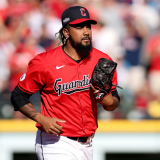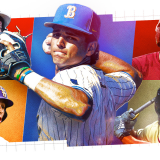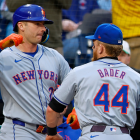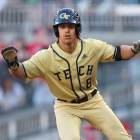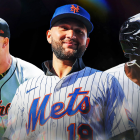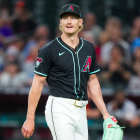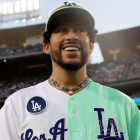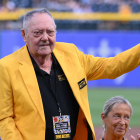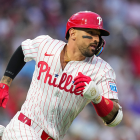2024 MLB trade deadline preview: Who's buying, who's selling and who's in between after first two months
The trade deadline is officially two months away

Oakland Athletics executive Billy Beane used to tell Peter Gammons that the season comes in three parts. The first two months are about figuring out what you have; the next two months are spent getting what you need; and, over the final two months, you field your best possible team. With the calendar flipping to June, we are officially in the "get what you need" phase of the season.
Yes, Major League Baseball's trade deadline (set for July 30) isn't a distant object anymore, the way it was when the Miami Marlins began their sell-off in early May. Other non-contenders have started to engage in dialogue concerning their most desirable trade chits. It's only a matter of time before the rumor mill gets to cranking and deals start getting made.
With that in mind, we here at CBS Sports wanted to provide a primer of sorts ahead of the mad season. Below, you'll find our reads on which teams will buy, which will sell, and which will have tough calls to make over the coming weeks, as well as the notable players who could be on the move.
1. The buyers
Everyone can agree that the usual suspects -- that being the MLB-best Phillies, the Dodgers, and the Yankees -- will be active heading into the deadline. Each has an obvious area of need: the Phillies could use some outfield help; the Dodgers pitching reinforcements; the Yankees an infielder. You can bet your bottom dollar that every contender will pursue another reliever.
For reasons largely beyond their control, the Braves have become the most interesting buyer. It's not just because they find themselves trailing the Phillies in the National League East, and it's not just because they'll have to get by without ace Spencer Strider and reigning MVP Award winner Ronald Acuña Jr. for the rest of the season. It's the combination of those developments that puts Alex Anthopoulos in an interesting place. In theory, the Braves can justify taking either a hyper- or hypo-aggressive to the deadline -- the latter because their core is almost completely locked into place. "Almost completely" doesn't mean completely, however, and the Braves do have to weigh the possibility that Max Fried (free agency) and Charlie Morton (who keeps talking about retirement) won't be on the team next season. If we had to guess, Anthopolous will likely err on the side of aggression, the way he always has -- he's usually the first mover each offseason for a reason, and it's hard to envision him standing pat when the Braves entered this season with serious World Series aspirations.
It feels like every three months we note that the Orioles have World Series hopes, an abundance of prospects, and a dearth of long-term financial commitments, making them the perfect candidate to do something bold. The closest they've come over the years was last offseason, when they obtained ace Corbin Burnes in what appeared to be a highly favorable deal for Baltimore. With new owner David Rubenstein in place, we might get an answer this deadline as to how much of the Orioles' previous aversion to big moves could be credited to top executive Mike Elias and how much had to do with an uncertain ownership situation.
The American League Central generally contains more sellers than buyers. That won't be the case this deadline. The Guardians, Royals, Twins, and even the Tigers have incentive to make win-now moves given the state of the division and wild-card races. It'll be interesting to see if and how that dynamic impacts the behavior of the individual teams. The Guardians have long had owner-imposed financial restraints, while the Twins had a quiet winter because of broadcast deal troubles; the Royals, meanwhile, don't have a great farm system to deal from, and the Tigers (by virtue of being the farthest back) might decide to keep their powder dry for the winter.
2. The sellers
On the other side of the spectrum, there are at least a handful of surefire sellers.
The Mets' month-long tumble makes them the most intriguing seller. Successful offseason bargain additions, including Luis Severino, Sean Manaea, and Harrison Bader, should draw plenty of interest on the market. Likewise, the Mets should be able to offer contenders some serious right-handed thump, be it in the form of designated hitter J.D. Martinez or first baseman Pete Alonso. Executives with other teams have warned that the return on Alonso might underwhelm relative to expectations; contemporary front offices simply don't value aging right-right first basemen like they used to, even when they have Alonso's track record. If they did, Alonso probably would already have a new long-term extension in hand, rather than an upcoming date with free agency.
The Marlins, under the guidance of new baseball operations head Peter Bendix, made the first big trade of the season in May, when they shipped Luis Arraez to the Padres for a four-player return. It won't be the last time this deadline the Marlins make a move. Bendix was brought in to modernize a franchise awash in antiquated processes and infrastructure. He spent the winter beefing up his front-office roster; now, it's time to disassemble a field roster that has failed to repeat last season's success. First baseman Josh Bell seems certain to be traded before August, while Bendix will have to weigh moving left-hander Jesús Luzardo and center fielder Jazz Chisholm Jr. now versus later. It's hard to imagine that Bendix views any player on his active roster as being untouchable, meaning that this could be an eventful (and, depending on your perspective, painful) summer for Miami.
Unlike last year, when Perry Minasian had to cut through persistent Shohei Ohtani speculation, the calculus is much easier for these Angels. They're sellers, and they've already indicated to other teams they're open to dialogue on their players. Expect Minasian to take calls on outfielder Taylor Ward and second baseman Luis Rengifo, and for him to move a few arms from a collectively underperforming bullpen. Two other names of note to watch here: veteran southpaw Tyler Anderson has rebounded from a rough first season in Los Angeles and has another year remaining on his contract, and live-armed righty José Soriano, who might represent Minasian's best chance at meaningfully improving a depleted farm system thanks to his ample remaining team control.
The Athletics, Rockies, and White Sox also figure into this bin, though their offerings pale in comparison. There's been and will continue to be a lot of speculation among other front offices about if the Athletics should move closer Mason Miller. He's undoubtedly one of the best relievers in baseball, and he's slated to be under team control until after the Athletics arrive in Las Vegas. At the same time, Miller has a messy injury history that has limited him to just over 100 professional innings (including this season) since he was drafted in 2021. Teams are seldom as aggressive in moving their pre-arbitration relievers as attrition rates suggest they should be, in part because of the optics hit. If ever there's been a team who can disregard that angle, it's probably the franchise willingly about to play in three different home markets over a five-year stretch.
3. The inbetweeners
The muddled state of the wild-card races means that a lot of teams will have to wait until deeper into the summer to decide on their deadline direction. There are three clubs in particular who we think will have some interesting conversations between now and August.
The Blue Jays, perpetual underperformers, haven't won a playoff game since 2016. If you required additional evidence that time doesn't wait for a core to reach its potential before marching onward, consider that Vladmir Guerrero Jr. and Bo Bichette are both slated for free agency after next season. If the Blue Jays slip more from the race between now and late July, would they contemplate trading either Guerrero or Bichette? Even if they do play better baseball heading forward, it seems like a question they'll have to seriously engage with heading into the winter.
The Reds were supposed to be a team on the rise after narrowly missing the postseason field last fall. That hasn't played out to plan, and the Reds are instead mired in last place thanks to a cocktail of injuries, suspension, and underperformance. The Reds presumably wouldn't move any of their long-term pieces, but it would make sense to shop a few short-term fixtures, such as starter Frankie Montas, reliever Lucas Sims, and infielder Jonathan India, among others.
Then there's the Diamondbacks, the defending National League champions. They've endured a rough stretch as of late, fueled by (what else?) underperformance and injuries. There's no need for an overhaul, but if the D-backs continue to sputter, they could make the services of impending free agents like first baseman Christian Walker and closer Paul Sewald available to bidding.




